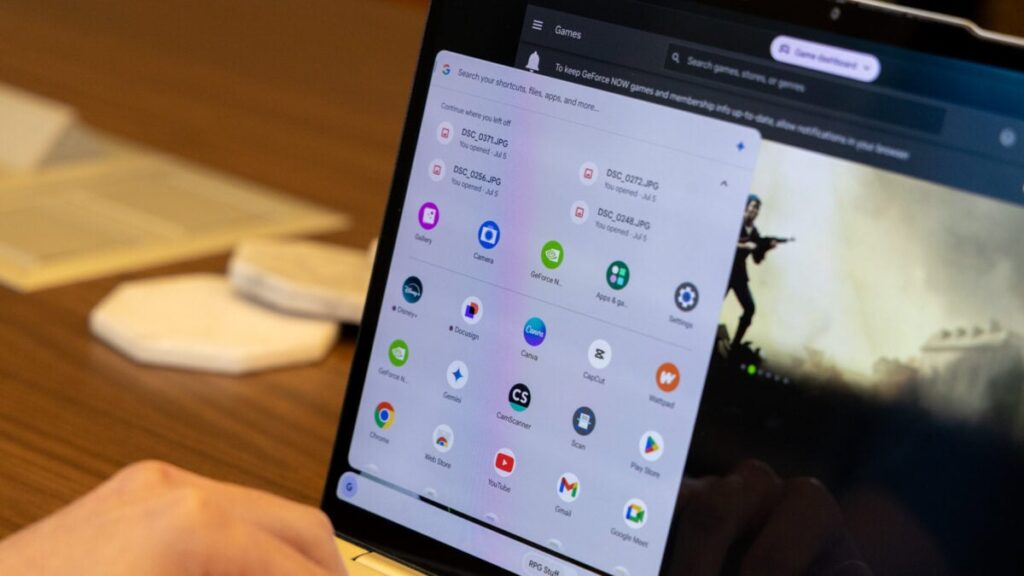Google’s getting in on PCs, and it could mean we’ll finally have another option beyond today’s stable of operating systems. After letting ChromeOS moulder in a sea of its own inadequacies, the tech giant confirmed it’s going to offer a true PC operating system alternative to macOS or Windows 11 sometime… eventually. At Qualcomm’s Snapdragon Summit (full disclosure: travel and lodging were paid by Qualcomm, and Gizmodo did not guarantee any coverage as a condition of accepting the trip), Google VP of Devices and Services Rick Osterloh spoke with Qualcomm CEO Christiano Amon and hinted about this new phase of Android.
“I’ve seen it, it’s incredible,” quipped Amon. With no other hints to go on, we need to consider what Google needs to do to make Android work on a big screen. Android on desktops or laptops needs to offer more than an Android-ified version of the latest iPadOS 26. Google could offer an OS that allows for the Mac-style continuity between devices without the walled garden that limits you to apps dictated by Google. I’m one of those PC users routinely miffed that Windows is force-feeding Microsoft’s first-party apps like OneDrive down our throats with annoying popup ads on desktop. A change of scenery would be welcome, but I’m not one ready to abandon my Steam library, either.
Android on PC will be stuffed with AI
For those curious, here’s Osterloh’s full comments about Google’s plans for Android on PC:
“In the past, we’ve always had very different systems between what we’re building on PCs and what we’re building in smartphones and we’ve embarked on a project to combine that. We’re building together a common technical foundation for our products on PCs and desktop computers, and I think this is another way that we can leverage all of the great work we’re doing together on our AI stack bringing Gemini models—bringing all of our application and developer community into the PC domain. So we’re really excited about this and I think this is another way in which Android is going to be able to serve everyone in every computing category.”
Without specifics, we can only guesstimate what form Android on PC could take. Of course, Google is going to fill its new OS to the brim with Gemini AI features. On Chromebook, this is in the form of Gemini and apps like NotebookLM accessible straight from the taskbar. Google would likely want to utilize the desktop space to stick Gemini directly into the main UI, akin to Microsoft shoving Copilot on the Windows 11 desktop. Already, Google apps like Gmail, Docs, Sheets, and more all contain a button that lets Gemini access your files. Sometimes this proves useful. AI is great for quickly filling out spreadsheets. In other ways, the AI can be idiotic. I can ask Gemini to find an email about an upcoming event for a company coming up in October, and it will tell me about an email from last year.
Using AI to its fullest requires retraining users’ expectations. That’s already a hard bargain when desktop or laptop users are used to the standard experience on macOS, Windows—and to a smaller degree—Linux. Android was born as a modified version of a Linux kernel. After so many years, the Android Open Source Project has taken on a life of its own and now rules as the bedrock for all mobile devices that aren’t part of Apple’s steadfast iOS domain. Android’s best option to muscle in on the PC space is to simply regress back to its Linux roots.
Google will have to try letting go

Nobody wants to be beholden to an app store. Google has continued to argue in court that sideloading and third-party app stores ruin the experience. Judges haven’t bought that line of thinking, and neither have users. There’s nothing bad about having full native access to all Android apps, but they need to work well on a larger display. Beyond that, users expect to download all their main productivity and gaming apps. Compatibility is what’s been holding back Qualcomm’s own ARM-based Snapdragon X-based PCs with Windows 11. Google would be better off ensuring users can access all the Linux versions of the most-popular apps than letting them load the mobile version of TikTok.
ChromeOS is dead simple. It borrows the Windows taskbar and enables a spare few features from the control center or through the Quick Access key on recent Chromebook Plus models. File management can feel like a chore. Tasks as simple as cropping photos to specific sizes aren’t simple on Chromebook’s default apps. A desktop OS requires a completely different frame of mind from what Google has done recently.
PC users want something clean, straightforward, and easy to manage. We don’t need the ostentation of Material 3 Expressive. We want to use all our current peripherals and external displays and change our settings to suit our needs. A new OS would need to facilitate users changing out components for their desktops or more customizable laptops. It sure seems like Google has its eye on Qualcomm’s PC chips to start. Still, this can’t be a one-and-done venture. Google, always in mind to take a hatchet to well-established features or apps (remember Stadia game streaming? I sure do) would need to support this new venture long-term. Compared to ChromeOS, this new software suite shouldn’t be beholden to streaming through the Chrome browser.

